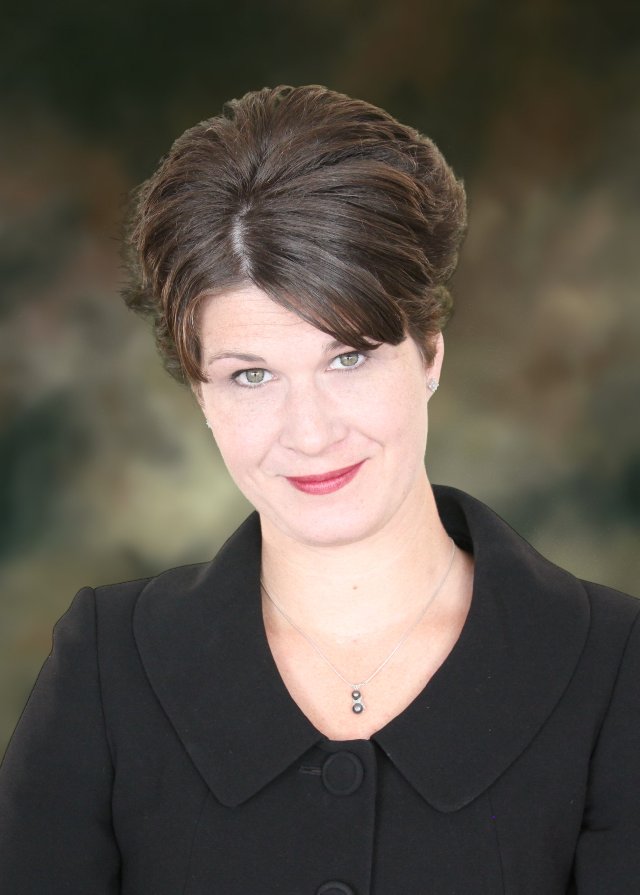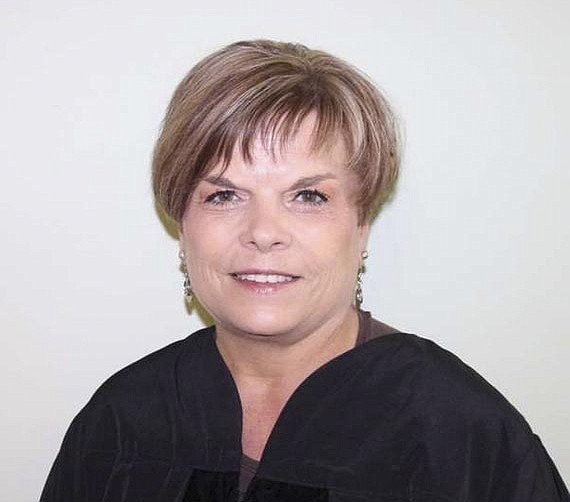Previous articles
* Who said the N-word in the Fannin County courtroom?* North Georgia newspaper publisher jailed over open records request* Georgia judge faces renewed ethics scrutiny after journalist's charges dropped* Emails reveal judge coached district attorney on prosecuting Fannin Focus publisher
 Appalachian Judicial Circuit District Attorney Alison Sosebee dropped charges against Mark Thomason and his lawyer, Russell Stookey, on Thursday. Sosebee sought grand jury indictments last month against the two at the request of Judge Brenda Weaver, for whom Sosebee served as a clerk in 2001 after law school.
Appalachian Judicial Circuit District Attorney Alison Sosebee dropped charges against Mark Thomason and his lawyer, Russell Stookey, on Thursday. Sosebee sought grand jury indictments last month against the two at the request of Judge Brenda Weaver, for whom Sosebee served as a clerk in 2001 after law school.BLUE RIDGE, Ga. - After a reporter tried to see how Judge Brenda Weaver spent taxpayer money, Weaver targeted a political rival for quietly supplying the ammunition.
On June 1, as part of a civil lawsuit, Fannin Focus publisher Mark Thomason issued a subpoena for copies of checks flowing out of Weaver's operating account. As part of the subpoena, Thomason attached a copy of a check. It came from the Fannin County general fund and had been deposited in Weaver's account.
Thomason figured the check would help bank employees identify the specific account he was looking for.
Two weeks later, according to emails obtained through an open records request, Weaver asked if Fannin County Attorney Lynn Doss had a copy of the check, too. Doss did.
Weaver concluded Doss was Thomason's source. She then wrote a draft of a court order, recusing herself and the other two Superior Court judges in the Appalachian Judicial Circuit from hearing Doss' cases.
"It appears that the above listed attorney performed her acts, along with others who are now being investigated, based upon bias, malice and ill will for the judges," Weaver wrote in the draft.
Weaver sent the draft to District Attorney Alison Sosebee, asking for her opinion. That same day, at Weaver's request, Sosebee presented a case to a grand jury against Thomason and his attorney, Russell Stookey. The grand jury indicted them on charges of identity fraud and attempt to commit identity fraud, claiming their subpoena of Weaver's account was illegal.
The grand jury also indicted Thomason on a charge of making false statements after he wrote in a records request that he believed checks issued to Weaver's account had been "illegally cashed" instead of deposited. His request did not explain what was illegal about that.
National news media swarmed to the case, and First Amendment groups chastised Sosebee and Weaver. Then the judge and the district attorney agreed to drop the charges.
As for the order that Weaver wrote against Doss, she never filed it. But upon learning about Weaver's draft, Doss said the judge acted unethically.
Doss said she never gave Thomason or Stookey a copy of a check intended for Weaver's account. She did, however, give copies of the checks to the FBI, she said. She doesn't know why investigators wanted them. A Georgia Bureau of Investigation spokesperson has also said the FBI is looking into Stookey's and Thomason's indictments.
But even if she did give Thomason a copy of a check, Doss said, who cares? A government employee sent the check from a government account to Weaver's publicly funded account.
"Some people don't understand public records," Doss said. "Had it been Judge Weaver's personal stipend, information should have been redacted. But Georgia Open Records law is very clear."
Doss also criticized Weaver for sending a draft of her order to Sosebee. She believes this constitutes ex parte (one-sided) communication because neither the judge nor the district attorney looped her in on the conversation.
"It's a big no-no for the (Georgia state) bar and for the judges," Doss said.
Weaver did not respond to a call or an email seeking comment. Sosebee, meanwhile, said she merely told the judge the information in her court order should come from the judge - and the judge alone.
"This is (the) only email to which I provided a response," Sosebee told the Times Free Press, when asked if her communication with Weaver constituted ex parte communication.
But Bob Rubin, president of the Georgia Association of Criminal Defense Lawyers, said Weaver should not have run the draft of a potential court order by Sosebee.
"She shouldn't turn to anybody," he said. "She should just do it. I've never seen the judge ask advice from the DA on a recusal, certainly not ex parte. The judges know the law. It stinks. It really does. I don't know how she's still sitting on the bench."
The division between Doss and Weaver shows the complications involved in investigating Blue Ridge's small-town politics.
Doss' husband, Harry Doss, ran unsuccessfully for district attorney against Sosebee in 2012. Sosebee had the backing of Weaver and her husband, George Weaver. She had worked for both of them.
Since the controversy in Blue Ridge erupted in June, Weaver has accused Doss of trying to overthrow her by joining forces with other prominent residents. Emails show Weaver is also well-connected.
"Getting the Weavers"
At first, it's hard to see how Weaver got involved in this controversy.
Last year, Thomason sued court reporter Rhonda Stubblefield, saying her transcript for a hearing may not have been accurate. Thomason lost that case. Stubblefield then sued Thomason for $1.6 million, claiming he compromised her reputation. She later dropped her case.
Earlier this year, the two sides argued about attorneys' fees. Thomason and Stookey say that Stubblefield's lawyer, Herman Clark, claimed that county taxpayers covered the cost of Stubblefield's legal bills. The money had come from an operating account controlled by one of the judges in the circuit, meaning public money had funded a private lawsuit against the local newspaper.
Thomason then issued the subpoena as part of the case with Stubblefield, curious how Weaver spent money out of the operating account.
On June 15, Sosebee said, Weaver and a GBI agent told her that someone used an "unknown document" to obtain account information without alerting Weaver. (Stookey denies this, saying he gave Weaver's assistant a heads-up.)
Sosebee's investigator, Christy O'Dell, then filed her own subpoena with Stearns Bank. As part of her subpoena, O'Dell asked for a copy of the subpoena that Thomason had filed, as well as any attachments he included.
That's when O'Dell, Sosebee and Weaver learned about the check. It was issued by Fannin County and deposited in Weaver's operating account.
Weaver emailed Fannin County Finance Director Rita Davis-Kirby on June 17.
"Is this one of the checks you provided to Lynn Doss in March, 2016(?)" Weaver asked.
"Yes it is," Kirby responded an hour later.
The next day, Weaver emailed Sosebee, telling her that Doss had given a check to Thomason or Stookey. She accused Doss of participating in a conspiracy against her.
"Doss needs to be questioned under oath as to when and who she gave copies of the Fannin checks and why?" Weaver told the district attorney. "She needs to be questioned about how many times she has met with Thomason, (Probate Court Judge Scott) Kiker, (Blue Ridge Police Chief Johnny Scearce), Stookey to discuss Stubblefield case or 'getting the Weavers.'"
Thomason said he actually received the checks from Kirby, not Doss. Emails he provided the Times Free Press seem to support his account. In one, after he asked for checks that had been sent to Weaver's account, Kirby told Thomason she already gave him the documents.
"I think you already have 2015 (check)," she wrote. "Wasn't that the open records request I filled for you back when the issue with Rhonda Stubblefield came up?"
This week, Kirby denied giving Thomason the check. When she wrote that email, she said, she thought she had given Thomason a check. Later, she looked back on her records and realized she hadn't actually filled Thomason's request because he didn't pay the proper fees.
She said her records revealed she gave those checks to Doss, though. But why does it matter who gave Thomason the check, since it's an open record?
"I didn't give him the checks," Kirby said, "and he's calling me a liar."
A recusal
On June 24, the same day a grand jury indicted Thomason and Stookey, Weaver emailed the district attorney a draft of her order. In it, she says the judges can't hear Doss' cases because Doss tried to undermine them.
"Please read the attached motion to make sure my facts agree with your investigation," she wrote to Sosebee. "This thing is getting so big that it is hard to separate my interviews from yours."
The next day, Sosebee told Weaver that some things don't add up between what the judge had found and what Sosebee's investigators have found. She cautioned Weaver not to accuse anyone of crimes in her order other than Thomason and Stookey.
"I will certainly take any reference to your office out of anything I write in the Recusal Order or anything I say in the future," Weaver responded.
Ashley Merchant, an attorney representing Thomason in a potential civil case with Weaver, said the emails suggest Weaver was targeting Doss before the case drew national scrutiny.
"It seemed like she was using her position as a judge to get her indicted," Merchant said.
Contact staff writer Tyler Jett at 423-757-6476 or tjett@timesfreepress.com. Follow him on Twitter @LetsJett.


